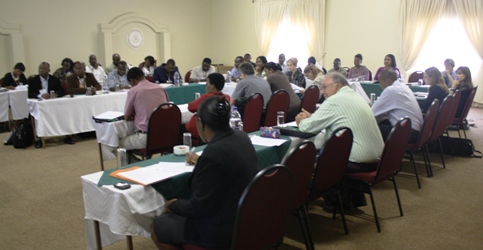
Workshop on Effective Management of Insect Resistance Programs in South Africa
November 4, 2011| |
An effective and functional African agri-biotech system requires customized and readily accessible Insect Resistant Management (IRM) resources and technical backstopping for the continent's stakeholders. This was one of the conclusions that wrapped-up a two- day Training of the trainers (TOT) workshop on insect resistance management (IRM) and stewardship practices held in Pretoria, South Africa from 27 to 28 October, 2011. The workshop organized by the NEPAD Agency ABNE in collaboration with CropLife International and AfricaBio was attended by 44 participants, including scientists, regulators and representatives from the biotech industry drawn from Burkina Faso, Ghana, Kenya, Nigeria, South Africa, and Uganda.
Diverse stakeholders in the continent have expressed concerns about the sustainability of the economic and environmental benefits of GM crops, due to possible evolution of insect and weed resistance. Thus, the objective of the workshop were to bring together African experts to identify gaps in knowledge on IRM and come up with ways of introducing effective and long-lasting IRM programs. The workshop provided opportunity for the stakeholders to reassess the risk of resistance and to identify the most effective strategies to preserve Bacillus thurigiensis (Bt) and other novel insect-resistant technologies in an African farming environment.
One of the outcomes of the workshop was the formation of the African IRM working group that will form a resource base for follow up and updating of information for decision makers and policy developers on IRM Programs. The experts will also serve as trainers in building capacity for effective insect resistance management within the agricultural community in Africa. A listserv was to be created for the group to facilitate information exchange and service delivery.
At the end of the workshop, participants agreed that there is need for an African insect resistance management (IRM) manual that adapts the existing Crop Life International (CLI) manual by incorporating African examples. The African IRM manual should have chapters that are case and situation specific; by crop, country and agro-ecological zone. The need to create a mechanism that gets IRM strategies to African farmers including developing simplified forms and messages for farmer usage was also identified.

For more information contact Prof. Diran Makinde, director of the African Biosafety Network of Expertise (ABNE), at diran.makinde@nepadbiosafety.net
| |
Biotech Updates is a weekly newsletter of ISAAA, a not-for-profit organization. It is distributed for free to over 22,000 subscribers worldwide to inform them about the key developments in biosciences, especially in biotechnology. Your support will help us in our mission to feed the world with knowledge. You can help by donating as little as $10.
-
See more articles:
-
News from Around the World
- Kufuor and Da Silva Receive World Food Prize
- Global Population Hits 7 Billion, Raising Urgency Of Addressing Hunger and Food Security
- Workshop on Effective Management of Insect Resistance Programs in South Africa
- Demonstration Days on Cotton BG II in Burkina Faso
- Zimbabwe Minister Sees Need to Do Biotech Research
- New Rice Varieties Offer Benefits to U.S. Growers
- MSU Scientists Discover New Proteins Involved in Photosynthesis
- Recommendations to Improve China's Agribiotech Regulations
- Review: Biotechnology Helps in Improvement of Environment
- Global Food Security and Modern Technology Tackled in China
- Pakistan to Train Farmers on GM Crops
- Asia Regional Workshops on Communicating Biotech
- KL- London Science Pact
- Cotton Production in Pakistan Affected by Floods
- EFSA : GM Maize Has no Adverse Effects on Health or Environment
- Independent Reports Evaluate EU's Legislation on GMOs
-
Research Highlights
- Effect of GNA Potato on Peach-potato Aphid
- Over-expression of OSRIP18 Increases Drought and Salt Tolerance in Rice
- Production of Bt Tomato to Control Insect Pests in Egypt
-
Beyond Crop Biotech
- Sequencing the Last Part of the Human Genome
- Duke Bioengineers Develop Optical Equivalent of Ultrasound
-
Announcements
- International Short Course on Science & Technology Communication
- FAO Biotech Website Launched
- Global Cassava Partnership Conference
- FAO Hosts Biotech Forum
-
Resources
- 2011 GAIN Report on Agribiotech in Japan
-
Read the latest: - Biotech Updates (January 14, 2026)
- Gene Editing Supplement (December 17, 2025)
- Gene Drive Supplement (February 22, 2023)
-
Subscribe to BU: - Share
- Tweet
